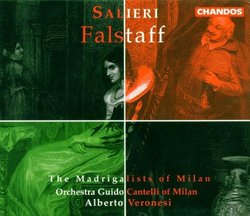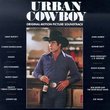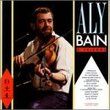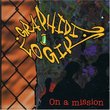| All Artists: Romano Franceschetto, Antonio Salieri, Alberto Veronesi, Milan Madrigalists, Guido Cantelli Orchestra Milan, Chiara Chialli, Lee Myeounghee, Natalia Valli, Giuliano De Filippo Title: Salieri: Falstaff Members Wishing: 0 Total Copies: 0 Label: Chandos Release Date: 3/17/1998 Genre: Classical Styles: Opera & Classical Vocal, Historical Periods, Classical (c.1770-1830) Number of Discs: 2 SwapaCD Credits: 2 UPCs: 095115961322, 009511596132 |
Search - Romano Franceschetto, Antonio Salieri, Alberto Veronesi :: Salieri: Falstaff
 | Romano Franceschetto, Antonio Salieri, Alberto Veronesi Salieri: Falstaff Genre: Classical
Amadeus, a great movie, made Antonio Salieri a sort of celebrity, but in terms of his value as a composer, it was misleading. This first recording, long overdue and very welcome, should help readjust Salieri's reputation. ... more » |
Larger Image |
CD DetailsSynopsis
Amazon.com Amadeus, a great movie, made Antonio Salieri a sort of celebrity, but in terms of his value as a composer, it was misleading. This first recording, long overdue and very welcome, should help readjust Salieri's reputation. By far the best opera based on Shakespeare's The Merry Wives of Windsor, is Verdi's Falstaff. But the lazy, cowardly, greedy, overweight, alcohol-soaked, sexually predatory, and somehow (despite everything) endearing antihero is big enough for more than one opera. Salieri's Falstaff is much simpler and smaller in scale than Verdi's, less inventive and energetic. But this is a sophisticated, funny, brightly performed treatment of Falstaff's attempt to woo two married women with identical love notes. --Joe McLellan Similar CDs
|
CD Reviews"It reeks of music" 05/03/2002 (5 out of 5 stars) "Salieri's "Falstaff, ossia le tre burli" ("Falstaff, or the three hoaxes"), to a libretto by Carlo Prospero Gianfranceschi, was first performed in Vienna in 1799, making it one of his last operas. It is a "dramma giocoso"..., that is, an opera buffa with some serious elements. This is an interesting time in the history of Italian opera -- Mozart's great operas were almost a decade in the past, and Rossini's about a decade away. Stylistically, though, we are closer to the classical than the bel canto. The various ensembles (including extended finales to each of the two acts) are reminiscent of Mozart -- Salieri obviously learned much from his great contemporary. Some of the numbers, too, have an element of opera seria parody, just as we find, say, in Fiordiligi's aria "Come scoglio" in "Cosi fan tutte".While it must be admitted that Salieri does not muster the depth of pscyhological insight into character that is a hallmark of Mozart's greatness, nor the effervescent sparkle which enlivens Rossini's comic operas, this is nonetheless a delightful work, which should give pleasure to anyone who enjoys the late classical Viennese style.If you wish to sample this lovely fare, try the lively Overture, which is a rondo based on a contredanse theme, that makes prominent use of the woodwinds, and ends in a blaze of glory a la Beethoven (who was, of course, Salieri's pupil). Another highglight is Falstaff's Act I aria ("Nell'impero di Cupido"), which is somewhat reminiscent of Bartolo's Act I aria in "Figaro" and even seems to look ahead to some of Rossini's buffo patter songs (I am thinking in particular of Don Magnifico's Act III aria in "Cenerentola").The performance here, by authentic Italian forces, does justice to the idiomatic character of classical Italian opera buffa. So much of the action takes place in secco recitatives -- those bits of quasi-sung, quasi-spoken dialogue accompanied only by basso continuo -- and it is essential, as here, that the singers impart the nuance of the Italian language to it. The wonderful ensemble is ably supported by Alberto Veronesi and his Milanese forces. (An odd feature I noticed is that the continuo instrument in the recitatives is a fortepiano, whereas in the musical numbers it is a harpsichord. Is this supposed to be an authentic touch? There is no explanation in the notes.)I wish to single out in particular the brilliant Florentine baritone, Romano Franceschetto, who carries on the great tradition of buffo baritones such as Giuseppe Taddei, Sesto Bruscantini, and more recently Claudio Desderi, who brings an acute, agile, intelligent mind and voice to his musical numbers and who does a beautiful job in the recitatives. In fact listening to the recitatives I almost thought I was listening to Bruscantini or Taddei.Gluck is supposed to have said of a piece of Salieri's, "Puzza di musica" -- "It reeks of music" -- and if you listen to this recording you will understand why Gluck held his disciple in such esteem. It is worth noting that Salieri held the most important musical job in Europe -- court composer to the Habsburg Imperial court -- and numbered Gluck, Haydn, and Mozart as friends and colleagues, and Beethoven, Schubert, Hummel, and Liszt as pupils. If you want to get an insight into this interesting composer, who lived at such a pivotal time in the history of music and made his small but not trivial contribution to it, forget "Amadeus", try this recording. It will have you asking for more." FALSTAFF: a good recording of Salieri's last operas!... J. E. ASENCIO-NEGRON | Guaynabo, Puerto Rico USA | 03/23/2000 (4 out of 5 stars) "A worthwhile issue of an opera composer whose dozens of works (i.e. Axur, re d'Ormus, Les Danaides, La Locandiera, etc.) are still little-known. A good recording of the Salieri's comedy, I enjoyed it. The arias are few, the ensembles many with complicated finales. However, I loved this recording wich embraces a remarkable teamwork, and is full of life and fun. It is very much an 18th-century opera buffa which takes liberties with Shakespeare's original (no Anne and Fenton; Mrs. Ford visits Falstaff disguised as a German woman - an excuse for comic mixture of German and Italian dialogue; only the Fords run any risk of marital separation) but which offers several enjoyable parodies of opera seria conventions. Falstaff, is one of Salieri's last operas (Vienna, 1799), and one of the first to derive its plot from Shakespeare's The Merry Wives of Windsor (later composers like Adolphe-Charles Adam, and Guisseppe Verdi composed operas on the same subject during the 19th century). The music of Salieri has remained forgotten (besides the fictional treatment of Salieri's supposed rivalry with Mozart in Peter Shaffer's study of jealousy, Amadeus), his name a foot-note in the lives of his pupils Beethoven and Schubert." Salieri was no joke 08/13/2001 (4 out of 5 stars) "Despite our compatriot's words to the contrary, Antonio Salieri was a magnificent composer who has composed some of the most moving scenes in all of operatic music. It is unfair to compare any musician to another since each musician has his/her own way of viewing a work and approaching that work. Mozart, obviously, would have taken a different approach to Falstaff just as Handel, Bach, Beethoven, Ligeti, or even Durufle would have taken. Each composer is unique and as true music lovers we must respect this and also respect Salieri's important, yet, unfortunately, mostly forgotten gargantuan comtribution to classical music."
|

 Track Listings (27) - Disc #1
Track Listings (27) - Disc #1

